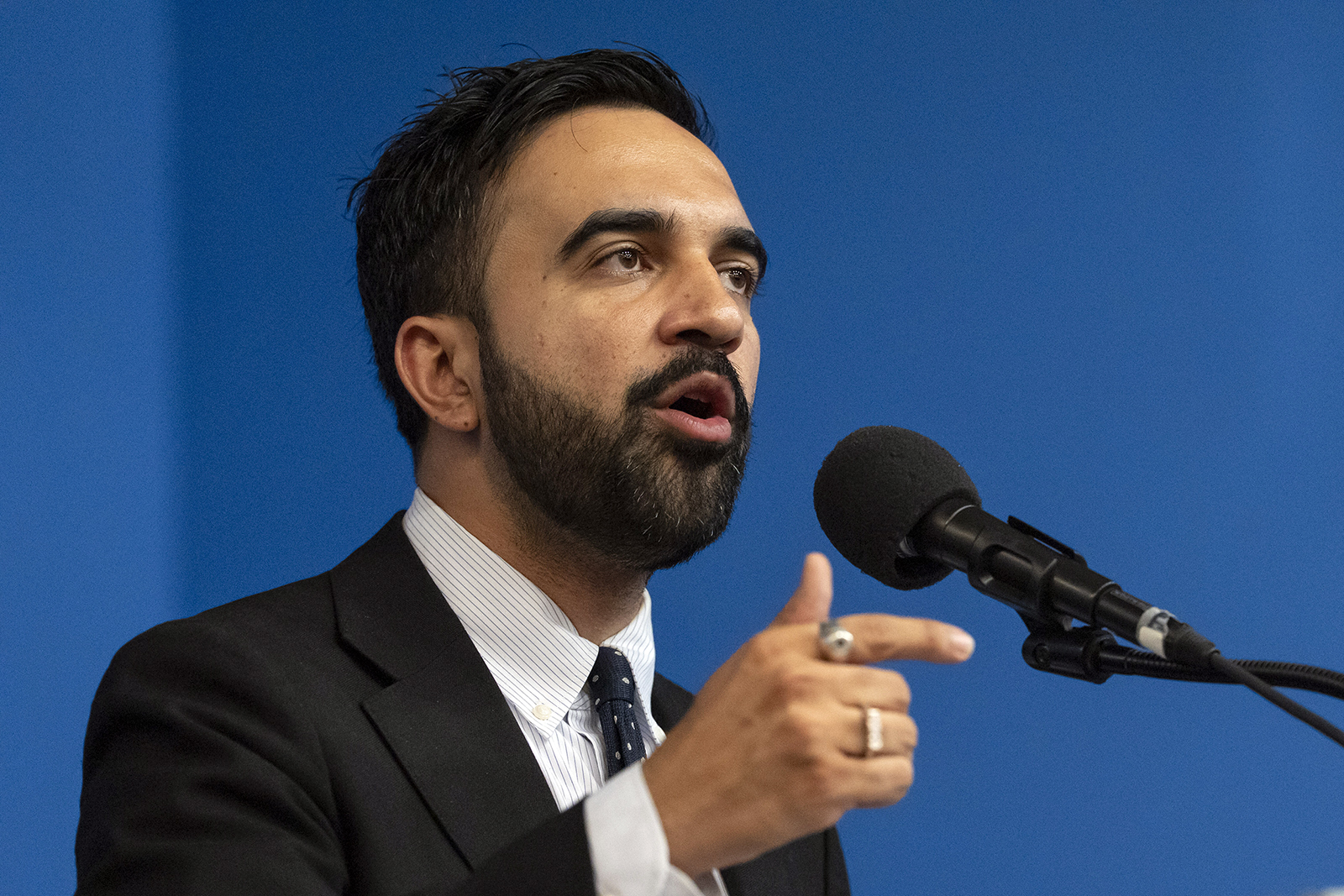
(RNS) — Halfway through Zohran Mamdani’s final rally in Queens on Oct. 26, a rabbi, an imam and a pastor took turns praising the 34-year-old democratic socialist who was leading polls heading into Election Day (Nov. 4) and would be, if he wins, the first Muslim to be elected mayor of the United States’ largest city.
Rabbi Sharon Kleinbaum, emerita spiritual leader of Congregation Beit Simchat Torah in Manhattan, called for Muslims and Jews to build a shared future in the city. The Rev. Charles Galbreath, pastor of the Alliance Tabernacle, a historically Black Brooklyn church, commended the candidate’s advocacy for immigrant communities amid the Trump administration’s mass deportations. Imam Khalid Latif, a former Muslim chaplain of the New York Police Department and a member of the Muslim Democratic Club, saluted Mamdani’s continued focus on affordability amid harsh Islamophobic attacks.
The moment reflected the Mamdani campaign’s efforts to make inroads with New York’s diverse faith communities. Over the past year, the assemblyman has attended Friday prayers, Diwali celebrations in Queens, Baptist church services in Harlem and Sukkot observances in Hasidic Williamsburg.
A Twelver Shiite Muslim born to Indian parents in Uganda, Mamdani has alternately put his own faith on display, making an emotional Oct. 24 speech outside a Bronx Islamic center about it. “I would no longer look for myself in the shadows. I will find myself in the light,” he said.
The speech came days after his opponent former Gov. Andrew Cuomo laughed along when a radio talk show host suggested that Mamdani would cheer another 9/11. (Cuomo later said he disagreed with the sentiment.)
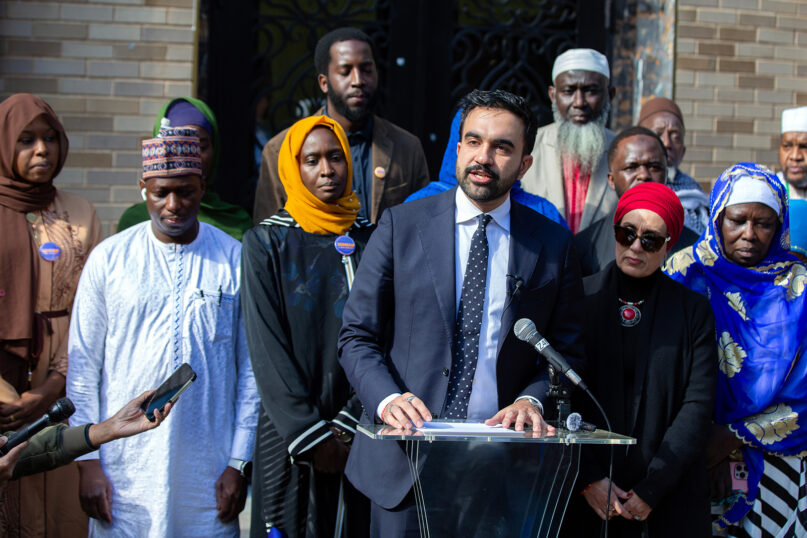
New York City Democratic mayoral candidate Zohran Mamdani speaks at the Islamic Cultural Center of the Bronx mosque in New York on Oct. 24, 2025. (AP Photo/Ted Shaffrey)
From its early days, Mamdani’s campaign sought to meet the city’s 350,000 Muslim voters where they are. Asad Dandia, a Brooklyn community organizer and ally of the campaign, said Mamdani called him to discuss his intentions and chances in the race in the summer of 2024, weeks before he launched his campaign that September.
On the final Friday before Election Day, volunteers from the campaign and other organizations canvassed at 210 of the city’s 300 mosques and knocked on doors in Muslim-heavy Brooklyn and Queens neighborhoods, handing out flyers to worshippers on their way to Friday prayer. In WhatsApp group chats, messages made the rounds in Urdu, Bangla, Arabic, Hindi and dozens of other languages.
Mamdani’s candidacy has been a “profound, profound moment for Muslims all over the city,” said Dandia, adding: “Muslims don’t just belong in the city. They belong in City Hall.”
Saman Waquad, president of the Muslim Democratic Club of New York City, said the campaign “has run the largest citywide Muslim outreach initiative in the history of New York City politics.”
Muslims in the city say that Mamdani’s policies are as important as his faith. Imam Shamsi Ali, of the Jamaica Muslim Center, said his community supports Mamdani’s promises to increase affordability through free child care and other issues that he says are affecting his community.
Ali’s endorsement helped Mamdani connect with the majority South Asian congregation at the Jamaica Muslim Center, a Queens mosque Mamdani has visited at least five times this year. “He even considers our community actually at the Jamaica Muslim Center as his own, one of his homes,” Ali said. “So when he comes to our mosque, he feels at home. And we feel him as a part of us as well. Our community is very close to him.”
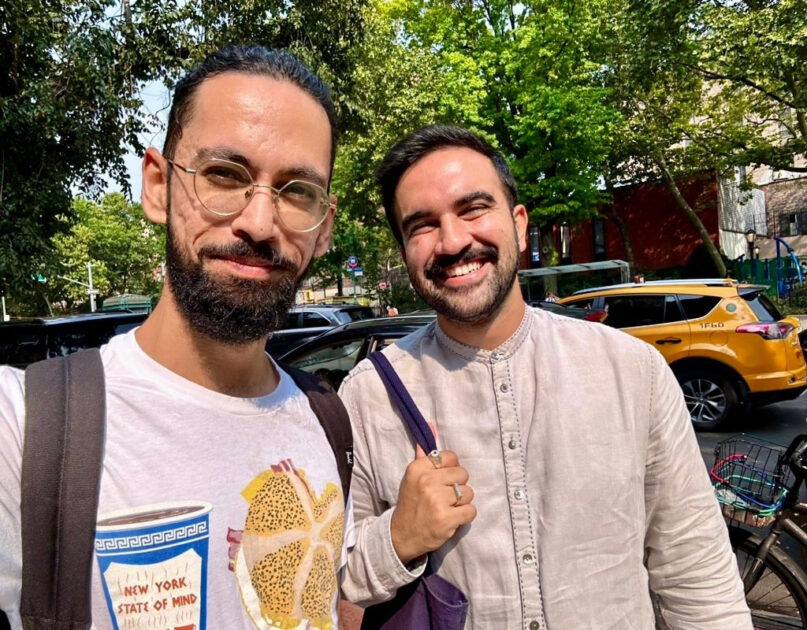
Asad Dandia, left, and Zohran Mamdani. (Photo courtesy of Asad Dandia)
Hajera Siddiq, who coordinated Mamdani’s visit to two Afghani mosques during Friday prayers in late September, said organizers tailored the campaign’s message to make it more relevant to the largely immigrant audience. “We can’t go to Afghans and say vote for him because he’s Muslim. That’s not enough,” she said.
But there is little question that he has energized Muslims to get to the polls. His run almost doubled Muslim turnout in primary voting from 2021, to 23% from 12%. Mohamed Gula, national organizer at Emgage Action, a group that works to mobilize Muslim voters, said the group’s goal was 35% turnout in the Nov. 4 election.“Before Zohran, our outreach efforts often revealed widespread voter apathy and a lack of political efficacy,” he wrote in an email to Religion News Service. “But with Zohran as our nominee, that has changed — voter apathy is no longer a barrier.”
Siddiq said that elders in her Afghani community have felt disconnected from city politics. Mamdani’s campaign has made them more engaged and hopeful. Afghani restaurant owners in Queens have lobbied their customers to support the candidate.
City Muslim leaders said Mamdani also won over their communities with his response to anti-Muslim attacks. “We can feel that it’s not easy, and that is one of the reasons why I personally and the community at large actually appreciate him because he was so brave to openly declare that he’s a Muslim trying to be the mayor of the city,” said Ali, the Jamaica Muslim Center imam. “It is truly uplifting us.”
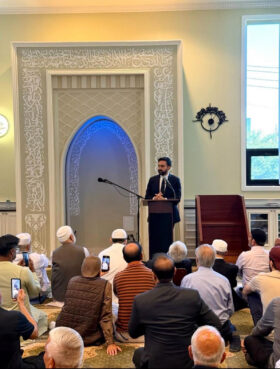
Zohran Mamdani speaks to people gathered for Friday prayers at Dar Al Taqwa Islamic Center, Oct. 26, 2025, in Queens, N.Y. The visit was coordinated by Afghans for Zohran, a volunteer group that campaigned for Mamdani. (Courtesy photo)
Mamdani has shown particular strength among younger voters, including younger Muslim voters. While their parents recall the rash of Islamophobia that followed the 9/11 attacks on lower Manhattan, Muslim Zoomers and Gen Alphas have been shaped by the first Trump presidency and its ban on immigrants from Muslim-majority countries.
“For them to see an alternative that speaks to their needs and offers kind of a paradigm of inclusivity and a platform of empowering them and telling them that ‘Our city is a city that has room for you’ goes a long way for these young kids.”
Mamdani’s attention to Muslim New Yorkers has not always sat well with other groups. On Oct. 17, he posed for a highly criticized photo with Imam Siraj Wahhaj of Masjid At-Tawqa, a prominent Brooklyn faith leader who was named an unindicted co-conspirator in the 1993 World Trade Center bombing, though he was never charged. Mamdani noted in response that past mayors have met with Wahhaj, and Mamdani called the backlash Islamophobic.
His support among younger progressives has also come in part from his willingness to speak for Palestinians in the West Bank and Gaza, which has alarmed many Jewish leaders inside and outside New York, including some 1,150 rabbis and cantors from across the United States who signed a letter opposing Mamdani and the “political normalization” of his anti-Zionism.
But Mamdani continues to show surprising strength among New York’s 1 million Jewish residents, especially with the anti-Zionist Jewish Voice for Peace and the progressive New York-based Jews for Racial and Economic Justice. The two organizations launched a joint campaign, “Jews for Zohran,” that has fielded thousands of volunteers to knock on doors and make phone calls on the candidate’s behalf.
“What we’re trying to make clear as ‘Jews for Zohran’ is that Jews thrive in a multiracial democracy where all voices are heard and celebrated and uplifted,” said Beth Miller, JVP Action’s political director.
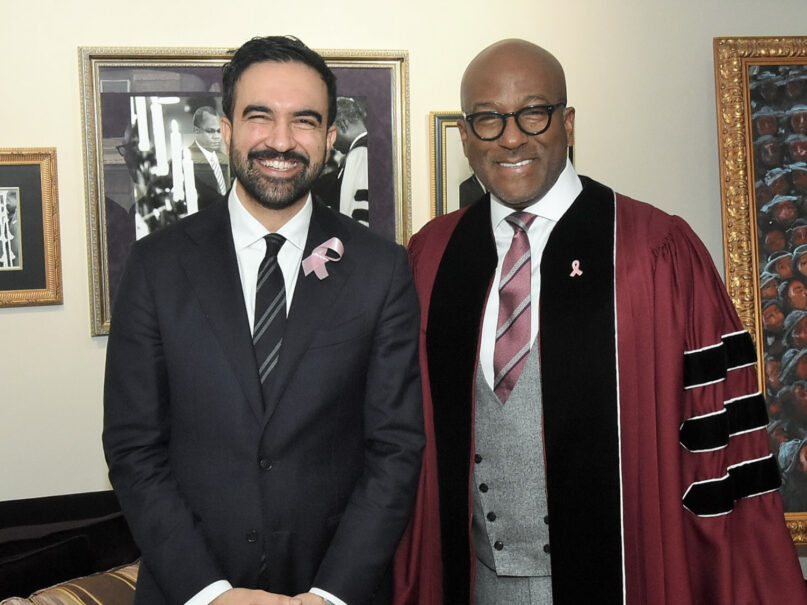
Mayoral candidate Zohran Mamdani, left, with the Rev. Kevin R. Johnson at Abyssinian Baptist Church. (Photo courtesy of Abyssinian Baptist Church)
Mamdani has worked hard to convince other doubters outside the Muslim community. After underperforming among Black voters in June’s Democratic primary, the candidate built ties with members of the city’s Black church establishment, who were comfortable with incumbent Mayor Eric Adams and well acquainted with Cuomo after his decade as New York state’s governor. Throughout Adams’ scandal-plagued administration, he forged a strong alliance with faith leaders, redefining their relationship with City Hall. In 2021, Adams won with overwhelming support from Black Christian congregations in Brooklyn and Queens.
Mamdani, a rather unknown assemblyman from Queens as recently as a year ago, took his stunning Democratic primary win as an opportunity to start from scratch. In early September, he met with the Rev. Kevin R. Johnson of Harlem’s storied Abyssinian Baptist Church. The candidate was invited back to address the congregation on a Sunday.
“He has a vision people are hurting right now in New York, and not just in New York, but across the nation,” said Johnson, who praised Mamdani’s affordability platform, without endorsing him. “As a Christian, I can respect his faith because he also respects my faith,” he said, adding that he was impressed by Mamdani’s unapologetic embrace of his Muslim identity.
On Oct. 19, Mamdani met with Black clergy in Brooklyn’s Crown Heights neighborhood, home to a large Caribbean community. The Rev. Leo Colon of In His Presence congregation prayed as a dozen faith leaders laid hands on Mamdani. The gesture, said Bishop Orlando Findlayter, who convened the meeting, was intended to bring protection for the candidate amid polarized politics.
Findlayter, a fixture in Brooklyn politics for years, helped former New York Mayor Bill de Blasio make inroads among Black voters in 2013. “Mamdani showed us that he is going to stand up and to defend all communities, but in this conversation, the immigrant community,” said Findlayter, the pastor of New Hope Christian Fellowship, a majority Caribbean church in Brooklyn’s East Flatbush neighborhood.
View this post on Instagram
Though he endorsed Cuomo in the June primary, Findlayter, along with dozens of Black clergy, publicly switched his endorsement to Mamdani at the meeting. In late July, Findlayter also organized a roundtable with Mamdani and other clergy members, during which Mamdani laid out his plan for the city and asked the faith leaders about their concerns.
Pastor Galbreath, of the Alliance Tabernacle, also praised Mamdani’s willingness to defend immigrant communities as a reason for his support, echoing the concerns of his majority Caribbean congregation in Brooklyn’s Little Haiti neighborhood.
The campaign approached Galbreath several months ago to attend community meetings with the candidate. Galbreath was impressed with Mamdani’s efforts to encounter the Black voters he had yet to convince, especially in “places that traditionally he probably would not have been,” said the pastor. “How directly, clearly he spoke to the needs that were present, and how it was felt in the room.”
Though he didn’t endorse Mamdani, Galbreath agreed to speak at the October rally in Queens because the campaign’s affordability focus aligned with his community’s priorities. “Wherever that’s being voiced, I want to be supportive of that, and that’s why I decided to show up and to share.”
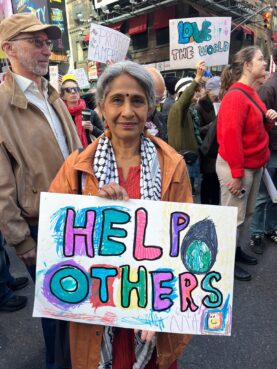
Sunita Viswanath, executive director of Hindus for Human Rights, holds a sign at the Times Square “No Kings” demonstration. (RNS photo/Fiona André)
The son of filmmaker Mira Nair, a Hindu whose movies have captured life in the Indian diaspora in the United States, Mamdani had an inside track with New York’s growing Hindu voting bloc.
Some 2% of New Yorkers identify as Hindu, the majority living in Queens. But as the Hindu festival season coincided with the stretch run toward Election Day, Mamdani accelerated his contact with the community. He visited at least six Hindu temples across Queens in October, including the oldest Hindu temple in the U.S. For Diwali, the Festival of Lights, the candidate distributed traditional Indian sweets with his mother.
Sunita Viswanath, a longtime Brooklyn resident and co-founder of the progressive Hindu organization Hindus for Human Rights, said Mamdani has an uncommon ability to relate to the diverse Hindu community.
“He spoke so beautifully about how that part of his upbringing — the stories, the tenets — made him who he is, and how important Diwali and Holi (Festival of Colors) were growing up,” she told RNS. “You could see that the celebration of this festival was part of who he is, and as a Hindu, that’s beautiful, and it makes me feel more connected to him.”
During the primary campaign, Viswanath started an affinity group called Hindus for Zohran. Its most recent event, on Saturday, was a prayer gathering that brought together Hindu leaders from Indo-Carribean, Nepali and Indian communities around New York to offer Mamdani a protective blessing for his last few days of electioneering. Nair, affectionately called “Momdani,” was in attendance.
“As a progressive Hindu of conscience, his core idea that our city should welcome all resonates with the Hindu notion that God is in you and me, no matter who you are,” said Viswanath.
Viswanath said Mamdani’s co-sponsorship of Assembly Bill 6920, which would introduce caste as a protected category in New York, has contributed to his support from like-minded Hindus who reject discrimination within the community based on one’s lineage or ancestry. “I’m a Hindu that is vehemently opposed to the extreme right wing forces, and I am gratified that he has fearlessly spoken for something more loving than the violence of Hindutva and Zionism,” she added.
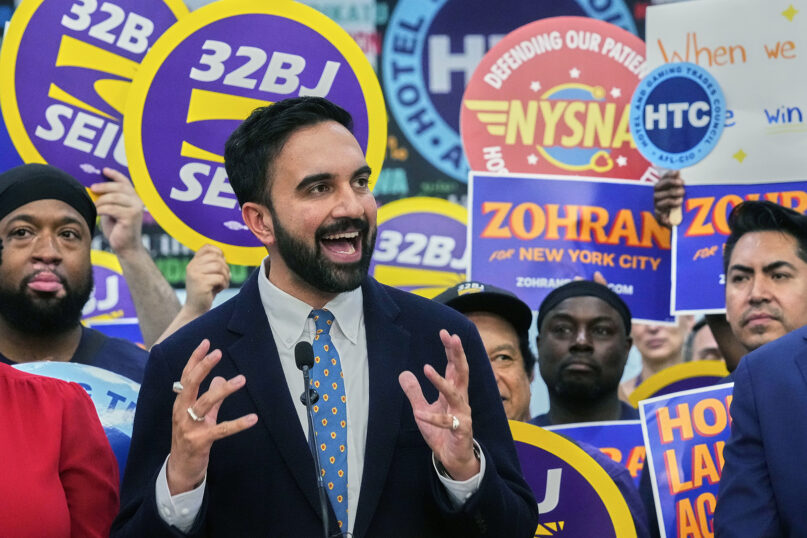
Democratic mayoral candidate Zohran Mamdani speaks during a rally at the Hotel & Gaming Trades Council headquarters in New York, July 2, 2025. (AP Photo/Richard Drew)
Mamdani’s critiques of Hindutva — the political ideology of Hindu nationalism — and against Indian Prime Minister Narendra Modi, whom he once called a “war criminal,” have alienated the candidate from other Hindus. An open letter signed by more than 20 Hindu and Indian diaspora organizations condemned Mamdani’s “Hinduphobic actions and statements” over his time as an assemblyman.
In 2021 he spoke at a rally in Times Square where a chant calling Hindus “bastards” could be heard from opponents of the construction of a controversial temple to the Hindu deity Ram in Ayodhya. While criticizing legislation passed by the Modi government that disenfranchised many Indian Muslims, Mamdani allegedly called another member of the state assembly, Jenifer Rajkumar, a “puppet of Hindu fascists.”
“Unfortunately, the statements highlighted above are nothing short of blatant bigotry and Hinduphobia and have caused great pain to many New Yorkers of Hindu faith,” said the letter, which was signed by prominent Hindu organizations Vishwa Parishad of America and HinduPACT.
But Ria Chakrabarty, policy director for Hindus for Human Rights and head of the newly formed HfHR Action, a lobbying organization whose first move was to endorse Mamdani, had a different take.
“A lot of the Islamophobia that Zohran is facing is also coming from within the Indian American community, or the Hindu nationalist corner of the Hindu Indian American community,” Chakrabarty told RNS. “They’re kind of just stuck on being Islamophobic to, I think, one of the few national politicians who are willing to dream of an inclusive future for South Asian Americans.”
At the Flushing Ganesha temple, one of the prominent Queens temples he visited last month, Mamdani addressed his previous comments about Modi, saying that many New Yorkers “may feel differently than me about Mr. Modi, and that’s their right, and I will look to represent them all the same.”
Lavanya DJ, co-leader of Hindus for Zohran, said Mamdani’s appeal with Hindus, as with many other New Yorkers, began with his ability to connect with the city’s taxi drivers and restaurant workers, through social media videos in Hindi, Urdu and Punjabi. “He loves New York the way that I love New York,” said DJ.
“Everything he does, he does with so much joy,” she said. “As a fellow Indian, you know, as a mother, one can daydream that their child will also grow up with these very strong core values that they will stick to, and values that speak on behalf of vulnerable people.”
Fiona Murphy and Yonat Shimron contributed to this article.
